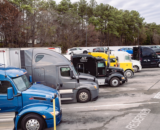/// Guest post by contributor Renewable Energy Group
Are you interested in biodiesel but concerned about the upfront investment? I have good news.
For truck stops and other retailers, biodiesel blends can likely be incorporated into your existing infrastructure with no modifications. And for your customers, diesel vehicles can start running on biodiesel blends right away.
Here’s what you need to know about adding biodiesel to your operations.
Drop-In Fuel
>Biodiesel is a drop-in solution that works in petroleum diesel equipment.
Infrastructure —Use your existing storage tanks and other infrastructure after you switch to biodiesel blends. For retailers, the federal government says dispensers containing B5 and lower do not need to be labeled, although you should check local regulations.
Some retailers choose to blend the fuel themselves. This may require a dedicated storage tank for the B100 and a blending system, but the return on investment is often achieved within months.
Vehicles —No modifications are needed. Just fuel up your diesel vehicles with biodiesel blends and hit the road.
All major OEMs support biodiesel blends up to B5, meaning the fuel is 5 percent biodiesel and 95 percent petroleum diesel. Nearly 90 percent of medium- and heavy-duty truck OEMs support B20.
Nationwide Supply
Biodiesel is a mature industry, and domestic producers can get you product no matter where you are. I recommend that you look for a producer that offers:
- Not just biodiesel, but also blended fuel and ULSD
- Distribution via truck, rail, ship and barge
- An extensive network of terminals, including ones co-located with petroleum diesel terminals
- Customer support that goes beyond a sales rep and includes technical assistance and logistics and supply chain management
What Fleets Say
That’s what you should look for in a producer. But what about your customers? What fleets will want to know above all else is how biodiesel affects performance. Let’s ask the people who know diesel equipment best — diesel technicians.
“If two trucks were side by side and one ran biodiesel and one didn’t, you would not be able to tell the difference,” says Joe Siadak, lead technician at Mahoney Environmental, a large nationwide trucking fleet.
When his company made the switch to biodiesel blends up to B20, he expected more fuel system failures and increased filter change intervals. The reality is they’ve had fewer problems with fuel injectors and after-treatment systems with biodiesel.
In Rochester, Minnesota, city buses have been running on biodiesel blends for nearly 20 years. Maintenance Manager Roger Ritchie has been there the entire time.
“I’m 100 percent on board with biodiesel,” he says. “Our equipment has lasted and done a really good job.”
Learn What Biodiesel Can Do for You
Making the switch is easy. To explore next steps, feel free to contact me at (515) 239-8166 or
troy.shoen@regi.com. Learn more about REG at regi.com.
Renewable Energy Group. REG is a leading North American advanced biofuels producer and developer of renewable chemicals. REG utilizes a nationwide production, distribution and logistics system as part of an integrated value chain model to focus on converting natural fats, oils and greases into advanced biofuels and converting diverse feedstocks into renewable chemicals. Learn more about Renewable Energy Group.
Subscribe to Updates
NATSO provides a breadth of information created to strengthen travel plazas’ ability to meet the needs of the travelling public in an age of disruption. This includes knowledge filled blog posts, articles and publications. If you would like to receive a digest of blog post and articles directly in your inbox, please provide your name, email and the frequency of the updates you want to receive the email digest.


